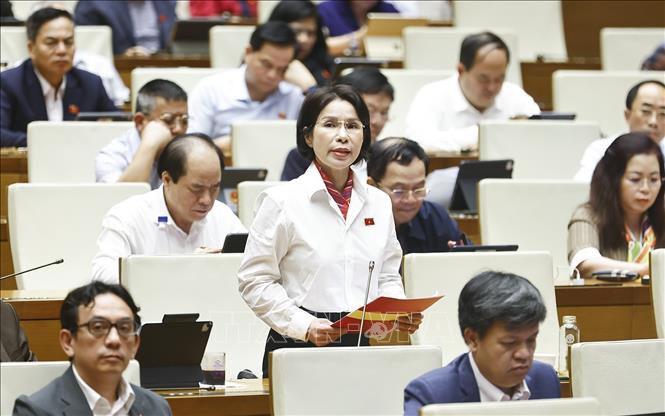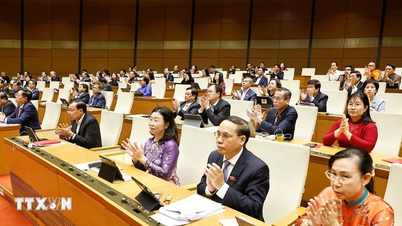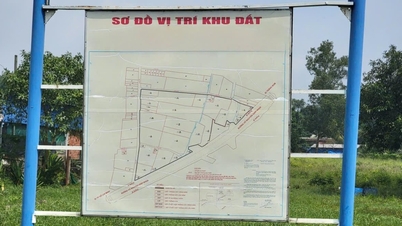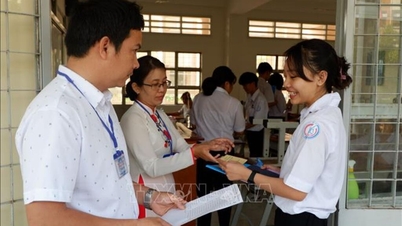Proposal to legalize school nutrition

Ho Chi Minh City National Assembly delegate Pham Trong Nhan speaks. Photo: Doan Tan/VNA
Discussing the draft Law on Disease Prevention, many delegates expressed their concern about the control mechanism for groups of products that increase non-communicable diseases such as: Products containing a lot of sugar, a lot of salt, fast food, ultra-processed products; in addition to the issue of school meal nutrition.
Delegate Pham Trong Nhan (Ho Chi Minh City) said that in order to control disease risk factors, it is necessary to supplement regulations. The Government is responsible for issuing and periodically updating a list of products and risk factors that are not beneficial to health; regulating management measures, including warning labels, restricting advertising, controlling distribution in educational institutions and applying appropriate health tax policies.
Delegate Pham Trong Nhan is concerned about the risk of a young generation becoming obese early, getting sick early and exhausted early... One of the reasons comes from the daily consumption environment, when it is not difficult to buy unhealthy food products such as snacks, soft drinks, fast food. These products contain a lot of sugar, salt, saturated fat, or products containing industrial spices, flavorings,... available in supermarkets and around school areas.
According to the delegate, chronic diseases are increasing alarmingly among young people, while the cost of treating non-communicable diseases currently accounts for 70% of total national health expenditure.
In addition, delegates proposed to ban marketing aimed at children under 16 years old on all platforms, clearly define safe areas for school nutrition; ban the sale and advertising of products with warning labels within schools according to the recommendations of the World Health Organization and in accordance with Vietnam's reality. Delegates also proposed to build a health tax on products containing sugar and fat, encourage businesses to improve their products; and at the same time reduce taxes on natural products with few additives, so that financial policies go hand in hand with health policies...
Also concerned about the issue of school nutrition, delegate Tran Thi Nhi Ha (Hanoi) said that the draft law does not have specific regulations on school nutrition, while this is the most important link to protect the health of the young generation.

National Assembly delegate of Hanoi City Tran Thi Nhi Ha speaks. Photo: Doan Tan/VNA
“It is time for Vietnam to legalize school nutrition, so that schools can truly become the 'first fortress' in disease prevention - where a healthy, intelligent and happy generation is formed,” delegate Ha suggested.
The female delegate also proposed to supplement regulations on nutrition in educational institutions. In particular, the Ministry of Health shall preside over and coordinate with the Ministry of Education and Training to issue national regulations on nutritional standards for school meals.
Educational institutions are responsible for organizing meals that ensure reasonable and scientific nutrition, limiting the use of unhealthy foods that may affect students' health. In addition, it is forbidden to display, advertise, or promote unhealthy products in and around school grounds.
Delegate Tran Thi Nhi Ha said that the legal system has regulations on preventing and combating the harmful effects of tobacco, alcohol, and beer - products that pose a direct risk to consumers' health, but there is still a "lack" of a comprehensive control mechanism for groups of products that increase non-communicable diseases (products containing a lot of sugar, a lot of salt, fast food, ultra-processed products, etc.)
Also according to delegate Tran Thi Nhi Ha, according to the World Health Organization, human health is affected by four basic groups of factors: Social, environmental, economic and behavioral. Therefore, disease prevention is not simply based on clinical and epidemiological issues, but needs to address root causes such as: living conditions, working environment, air quality, clean water, food and access to health services.
Therefore, it is necessary to expand the scope of the law to create a clear legal basis for the development of public health improvement programs, and at the same time, specifically define the responsibilities of each ministry, branch, and government at all levels in managing and controlling risk factors to protect people's health. Disease prevention is not only through medicine and hospitals, but also through a healthy living environment, fair economic and social policies, and positive living behaviors.
Need to expand policies to support childbirth and child care
At the meeting, delegates also gave their opinions on the draft Law on Population. Delegates said that maintaining the replacement fertility rate is a task that cannot be undertaken by the State alone, but requires the participation of economic, social organizations and businesses. Delegates proposed expanding regulations on the subjects responsible for supporting employees to maintain fertility rates, through flexible policies on maternity leave, financial support or a friendly working environment. Because in reality, many women, although they want to have children, are still reluctant to take maternity leave due to concerns about income or career opportunities.
Commenting on this content, delegate Nguyen Hoang Uyen (Tay Ninh) said that Article 13 of the draft law stipulates a number of support policies to encourage having two children, such as maternity leave, financial support, and housing.
These policies not only reduce the burden of childcare for families, creating conditions for women, especially female workers, to return to the labor market early, but can also be combined with a policy of reducing personal income tax for families with two children. This is a form of direct support, strong encouragement and in line with the policy trends of some countries facing low birth rates.
However, delegates said that the actual implementation of these policies, especially housing support, encountered many difficulties due to limited resources and the ability to balance the budget, especially in localities with difficult economic conditions...
Delegates suggested that the Drafting Committee review the regulations in a flexible and practical manner, while adding sustainable policies, such as developing a system of childcare services, public and non-public preschool education, and ensuring quality.
Source: https://baotintuc.vn/thoi-su/de-xuat-co-che-kiem-soat-cac-nhom-san-pham-lam-gia-tang-cac-benh-khong-lay-nhiem-20251110183707289.htm




































































































![Dong Nai OCOP transition: [Article 3] Linking tourism with OCOP product consumption](https://vphoto.vietnam.vn/thumb/402x226/vietnam/resource/IMAGE/2025/11/10/1762739199309_1324-2740-7_n-162543_981.jpeg)











Comment (0)